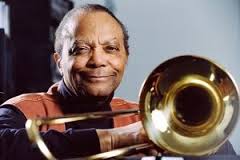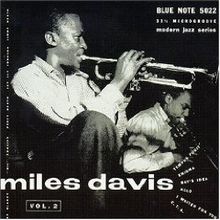Enigma – J.J. Johnson
A classic composition with a soaring, unforgettable melody. Our lead sheet comes from the original J.J. Johnson manuscript and presents it just how he envisioned the piece.
- Recording: Miles Davis - Miles Davis Volume 2
- Recorded on: April 20, 1953
- Label: Blue Note (BN CDP 7-81502-2)
- Concert Key: C
- Vocal Range: , to
- Style: Ballad
- Trumpet - Miles Davis
- Trombone - J.J. Johnson
- Tenor Sax - Jimmy Heath
- Piano - Gil Coggins
- Bass - Percy Heath
- Drums - Art Blakey
0:00
0:00
Buy MP3
- Description
- Historical Notes
- Solos
- Piano Corner
- Bass Corner
- Drum Corner
- Guitar Corner
- Inside & Beyond
- Minus You
A tender, memorable ballad, Enigma is one of J.J. Johnson's most important compositions. We're proud to offer the original—our lead sheet is from J.J.'s own manuscript indicating exactly how he conceived of the melody.
As background, J.J. originally wrote Enigma in C concert, a key with a bright sound. However, his first arrangement was for a Miles Davis recording, where the melody was in D-flat, sounding darker and more subdued.
We don't have a recording of Enigma in C concert. Our audio excerpt is from J.J.'s sextet arrangement for Miles. It starts with J.J.'s four-measure intro which, ingeniously, comes from the first four measures of the C (concert) bridge. The melody enters immediately after in D-flat concert.
For J.J.'s classic Miles Davis sextet arrangement, see our Second Floor Music Enigma sextet. That arrangement adds a double-time-feel extension at the end of the second and last A sections which other artists have also used in their recordings. You now have the option to experience Enigma from two important perspectives, the original lead sheet on jazzleadsheets.com and J.J.'s marvelous arrangement.
As background, J.J. originally wrote Enigma in C concert, a key with a bright sound. However, his first arrangement was for a Miles Davis recording, where the melody was in D-flat, sounding darker and more subdued.
We don't have a recording of Enigma in C concert. Our audio excerpt is from J.J.'s sextet arrangement for Miles. It starts with J.J.'s four-measure intro which, ingeniously, comes from the first four measures of the C (concert) bridge. The melody enters immediately after in D-flat concert.
For J.J.'s classic Miles Davis sextet arrangement, see our Second Floor Music Enigma sextet. That arrangement adds a double-time-feel extension at the end of the second and last A sections which other artists have also used in their recordings. You now have the option to experience Enigma from two important perspectives, the original lead sheet on jazzleadsheets.com and J.J.'s marvelous arrangement.
The many recordings of Enigma show its versatility as a composition. Twelve years after the first recording, Milt Jackson recorded it on his album "Milt Jackson At The Museum Of Modern Art." Al Haig
recorded it on his album "Milt Jackson At The Museum Of Modern Art." Al Haig later recorded it three times between 1974 and 1975. Enigma went on to become something of a modern standard with jazz artists, having been recorded many times since 1953 by a wide variety of artists such as Ralph Moore
later recorded it three times between 1974 and 1975. Enigma went on to become something of a modern standard with jazz artists, having been recorded many times since 1953 by a wide variety of artists such as Ralph Moore , Ryan Kisor, Steve Turre, Toshiko Akiyoshi
, Ryan Kisor, Steve Turre, Toshiko Akiyoshi , Michael Weiss
, Michael Weiss , Michael Benedict
, Michael Benedict and Vic Lewis
and Vic Lewis . J.J. didn't record it as a leader himself until 1996 on The Brass Orchestra
. J.J. didn't record it as a leader himself until 1996 on The Brass Orchestra , where he commissioned Slide Hampton to write a new arrangement.
, where he commissioned Slide Hampton to write a new arrangement.
Related Songs
Email Send Enigma to a friend
Send this page to a friend via email. Add your name or email in the first field. In the second, add one or more email addresses, separated by a comma.

J.J. Johnson
January 22, 1924 – February 4, 2001
J.J. Johnson is arguably the most influential bop and post-swing trombonist and also one of the great composers and arrangers in jazz. He was one of the first trombonists to embrace bebop; his playing continues to exert a strong influence on other musicians. He started his recording career in 1942 in Benny Carter's big band. On July 2, 1944, J.J was on the first Jazz At The Philharmonic concert. He recorded with the Count Basie Orchestra beginning in 1945. Read more...
There was a problem.
...



